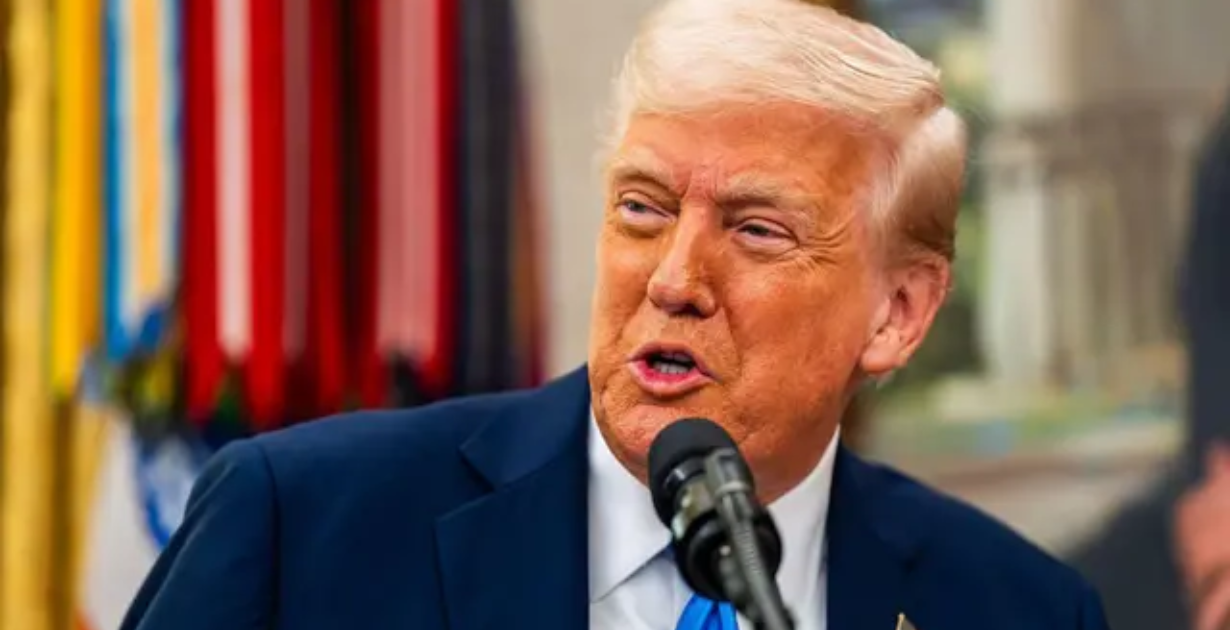Trump Sparks Continental Trade War
The President of the United States, Donald Trump has declared a strong trade war by his imposition of tariffs hit on many countries in various continents including Africa.
On Wednesday, President Donald Trump implemented a 10% baseline tax on imports from 185 nations and imposed even higher tariff rates on dozens of others, including Nigeria, which he criticized for its 14% tariff regime.
Furthermore, the United States would impose a 34% tax on imports from China, a 20% tax on imports from the European Union (EU), a 25% tax on South Korea, a 24% tax on Japan, and a 32% tax on Taiwan, as indicated by a chart that Trump displayed during his speech at the White House.
In addition to Nigeria, the new policy will have a significant impact on the following African countries: Algeria (30%), Lesotho (50%), Mauritius (40%), Kenya (10%), Namibia (21%), Ethiopia (10%), and Ghana (10%). A reciprocal tariff of 30% was imposed on South Africa.
The president employed aggressive language to characterize a global trade system that the United States assisted in establishing following World War II, asserting that “our country has been looted, pillaged, raped, plundered” by other nations.
In order to implement the tariffs, Trump declared a national economic emergency, which is anticipated to generate hundreds of billions in annual revenue. He has pledged that the tariffs will result in the return of factory employment to the United States.
Nigeria’s exports to the United States have been subject to fluctuations in recent years, as indicated by THISDAY’s investigations.
Exports were valued at approximately $4.9 billion in 2022, a significant increase from the $3.6 billion reported in 2021.
Nevertheless, in 2023, exports experienced a decline to $4.86 billion. Crude oil and natural gas are the primary dominant exports from Nigeria to the United States.
Cocoa and cocoa products, Sesame grains, Ginger and spices, Solid Minerals & Metals, and manufactured & semi-processed commodities are all included in lesser quantities.
The African Growth and Opportunity Act (AGOA) also provides Nigeria with duty-free access to the US market for specific exports. Nevertheless, crude oil continues to be the most significant export.
However, the Associated Press report also noted that Trump’s policies pose a risk of an abrupt economic downturn, as consumers and businesses may encounter significant price increases on vehicles, clothing, and other products.
In remarks at the White House, Trump stated, “Taxpayers have been defrauded for over fifty years.” “However, it will no longer transpire,” he concluded.
Trump was fulfilling a critical campaign pledge by implementing what he termed “reciprocal” tariffs on trade partners, acting without the approval of Congress under the 1977 International Emergency Powers Act.
This extraordinary endeavor was intended to disrupt and ultimately transform America’s trading relationship with the world.
The administration anticipates that other nations will reduce their tariffs and other trade barriers, which it claims have contributed to a $1.2 trillion trade imbalance last year.
Consequently, the tariffs could remain in effect for an extended period, as they would affect foreign entities that sell more goods to the United States than they purchase.
The tariffs are in accordance with recent pronouncements of 25% taxes on auto imports, duties against China, Canada, and Mexico, and increased trade penalties on steel and aluminum.
Trump has also implemented tariffs on countries that import crude from Venezuela and intends to implement distinct import taxes on pharmaceutical medications, lumber, copper, and computer processors.
The administration has not publicly reevaluated its strategy, despite the potential for political repercussions, as voters in the previous year’s election expressed their desire for Trump to address inflation in response to the warning signals of a declining stock market and a decrease in consumer sentiment.
Trump would be implementing these tariffs independently; he has the ability to do so without obtaining congressional approval.
That makes it simple for Democratic legislators and policymakers to criticize the administration if the uncertainty expressed by businesses and declining consumer sentiment are indicators of impending trouble.
In response to the steel and aluminum tariffs, the European Union imposed taxes on 26 billion euros’ worth ($28 billion) of US products, including bourbon.
This action prompted Trump to threaten a 200 percent tariff on European alcohol.
Trump has consistently accused America’s allies and adversaries of essentially defrauding the United States through a combination of tariffs and other trade barriers, prompting many to believe that they have been coerced into a confrontation.
news via inbox
Get the latest updates delivered straight to your inbox. Subscribe now!




